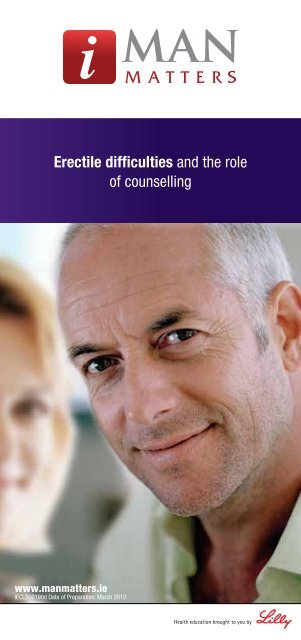Download the PDF - Man Matters
Download the PDF - Man Matters
Download the PDF - Man Matters
Create successful ePaper yourself
Turn your PDF publications into a flip-book with our unique Google optimized e-Paper software.
Erectile difficulties and <strong>the</strong> role<br />
of counselling<br />
www.manmatters.ie<br />
IECLS00190d Date of Preparation: March 2012<br />
Health education brought to you by
Get Informed<br />
Get Checked<br />
What is Erectile Dysfunction?<br />
Erectile Dysfunction (ED), also sometimes known as<br />
impotence, is <strong>the</strong> persistent or recurrent inability to get<br />
and/or keep an erection sufficient for satisfactory sexual<br />
intercourse. This happens when not enough blood can get<br />
into <strong>the</strong> penis or stay long enough to allow an erection.<br />
<strong>Man</strong>y men live with ED for years without seeking medical<br />
advice, because of embarrassment or a belief that<br />
ED cannot be treated. However <strong>the</strong>re are a number of<br />
treatment options available. In addition, ED may be an<br />
early warning sign of o<strong>the</strong>r conditions. So it makes sense<br />
not to allow embarrassment get in your way - if you are<br />
worried about ED, go to your doctor without delay to get it<br />
checked out and treated.<br />
Erectile Dysfunction is a common condition and over 50%<br />
of men aged over 40 will experience some degree of ED at<br />
some stage in <strong>the</strong>ir lives. 1<br />
If you are worried you may<br />
have ED, talk to your doctor<br />
and get it checked out.<br />
<strong>Man</strong>y men find talking about such intimate matters very<br />
difficult but rest assured that your doctor is used to<br />
dealing with such subjects. Talking about your ED can<br />
be an important part of treating it and your doctor may<br />
refer you to a counsellor to discuss <strong>the</strong> issue fur<strong>the</strong>r. A<br />
counsellor will have a lot of experience dealing with sexual<br />
dysfunction and will be able to put you at ease. For more<br />
information on <strong>the</strong> role of counselling please turn overleaf.<br />
Make an appointment today to see your doctor to get<br />
help and advice.<br />
What causes ED?<br />
In many cases, ED is caused by a combination of both<br />
physical and psychological factors. A proper medical<br />
assessment is important as ED could be caused by an<br />
underlying physical illness, medication side effects, or<br />
be related to psychological issues - some examples<br />
include: Physical Causes: Diabetes, Heart disease, High<br />
blood pressure, Kidney failure, Post-operative effects:<br />
Following prostate surgery, Psychological causes:<br />
Stress, O<strong>the</strong>r conditions: Prostate cancer, Nerve<br />
problems, e.g. multiple sclerosis and Parkinson’s disease,<br />
Trauma, Medication side effects: ED may be caused by<br />
a side effect of medication that you are taking.
Act<br />
Act<br />
Counselling<br />
A counsellor is a qualified health care professional to<br />
whom you can talk about ED, how it is affecting you, what<br />
may be causing it and what you can do about it. Men with<br />
sexual dysfunction generally benefit from counselling.<br />
Your doctor may provide counselling for you as part of<br />
your overall treatment. If your doctor considers that you<br />
will benefit from seeing a specialist sexual & relationship<br />
counsellor, he or she will be able to recommend one.<br />
What you can expect from<br />
sexual and relationship<br />
counselling<br />
The counsellor will be able to teach you about techniques<br />
that work well for managing ED symptoms. These<br />
techniques can be especially effective if you are very<br />
anxious about being able to get or keep an erection.<br />
After <strong>the</strong> first session you might see your counsellor every<br />
week, but with this kind of counselling <strong>the</strong> appointments<br />
may become more spread out to give you time to try out<br />
any techniques or exercises.<br />
To get <strong>the</strong> most out of sexual & relationship counselling,<br />
it is important to participate fully in your sessions and<br />
make time between sessions to think about what you have<br />
discussed and try out any techniques that your counsellor<br />
has recommended.<br />
A sexual & relationship counsellor is trained to assess and<br />
treat sexual difficulties including ED in a supportive and<br />
non-judgemental manner. As with any type of counselling,<br />
confidentiality is assured, so anything you discuss will<br />
be kept between you and your counsellor. You will not<br />
undergo any medical examination or need to take your<br />
clo<strong>the</strong>s off. The counsellor will explain that you do not<br />
have to answer any questions or do any exercises that you<br />
don’t feel comfortable with.<br />
Sexual & relationship counsellors work with men on <strong>the</strong>ir<br />
own as well as couples, so you can choose to go alone or<br />
with your partner if you prefer.<br />
Sessions typically last for 50 minutes. Your first session<br />
may be longer so that <strong>the</strong> counsellor can make an initial<br />
assessment.<br />
ED is often linked to what is going on in <strong>the</strong> rest of your life<br />
such as stress, family matters, and physical difficulties, so<br />
<strong>the</strong> counsellor may discuss <strong>the</strong>se with you. They will be<br />
skilled at helping to put you at ease so that you can speak<br />
openly.
Act<br />
Act<br />
Assessment<br />
If you think you may have ED, <strong>the</strong>re are some questions on<br />
<strong>the</strong> next page and a questionnaire on <strong>the</strong> reverse which<br />
may help you to tell your doctor about <strong>the</strong> problems you<br />
are experiencing and also help him/her to assess you.<br />
The questions on <strong>the</strong> reverse are taken from <strong>the</strong> Sexual<br />
Health Inventory For Men Questionnaire. 2<br />
This is a validated questionnaire used by doctors. It asks<br />
basic questions about your erectile function over <strong>the</strong> past<br />
6 months. Each question has several responses, and<br />
you should choose <strong>the</strong> one that best describes your own<br />
situation.<br />
Once completed, tear this page off and make an<br />
appointment to see your GP. Act today!<br />
For more information, visit<br />
www.manmatters.ie<br />
Questionnaire<br />
What is your age?<br />
When did you first start experiencing erection problems?<br />
Since you started experiencing erection problems,<br />
have <strong>the</strong>y gradually got worse over time?<br />
❏ Y ❏ N<br />
Do you suffer from any of <strong>the</strong>se conditions?<br />
❏ Diabetes<br />
❏ Heart disease<br />
❏ High blood pressure<br />
❏ Kidney problems<br />
❏ Prostate surgery<br />
❏ Spinal cord injury<br />
❏ Nerve damage<br />
❏ Depression or anxiety<br />
❏ None of <strong>the</strong> above<br />
References:<br />
ACT!<br />
1. Feldman, H. et al. Impotence and its Medical and Psychosocial Correlates: results<br />
of <strong>the</strong> Massachusetts Male Aging Study. Journal of Urology, 1994;151: 54-61.<br />
2. Rosen RR et al. Research Instruments For The Diagnosis And Treatment Of<br />
Patients With Erectile Dysfunction. Urology 2006; 68 (supplement 3A): 6-16<br />
IECLS00190d<br />
Date of Preparation: March 2012<br />
GET<br />
INFORMED<br />
GET<br />
CHECKED<br />
3<br />
STEPS<br />
Health education brought to you by<br />
Health education brought to you by
Over <strong>the</strong> past 6 months:<br />
Sexual Health Inventory for Men Questionnaire 2<br />
Choose one response from each question based on <strong>the</strong> past 6 months and write <strong>the</strong> corresponding number in <strong>the</strong> box next to <strong>the</strong> question.<br />
Adapted from Rosen RR et al. Urol 2006; 68 (supplement 3A):6-16<br />
1. How do you rate your confidence that<br />
you could get and keep an erection?<br />
1 Very low<br />
2 Low<br />
3 Moderate<br />
4 High<br />
5 Very high<br />
2. When you had erections with sexual<br />
stimulation, how often were your<br />
erections hard enough for<br />
penetration?<br />
0 No Sexual<br />
Activity<br />
1 (Almost never/<br />
never)<br />
2 (A few times,<br />
ie, much less<br />
than half <strong>the</strong><br />
time)<br />
3 (Sometimes,<br />
ie, about half<br />
<strong>the</strong> time)<br />
4 (Most times.<br />
ie, much more<br />
than half <strong>the</strong><br />
time)<br />
5 (Almost<br />
always/<br />
always)<br />
3. During sexual intercourse, how<br />
often were you able to maintain your<br />
erection after you had penetrated<br />
(entered) your partner?<br />
0 (Did not<br />
attempt<br />
intercourse)<br />
1 (Almost never/<br />
never)<br />
2 (A few times,<br />
ie, much less<br />
than half <strong>the</strong><br />
time)<br />
3 (Sometimes,<br />
ie, about half<br />
<strong>the</strong> time)<br />
4 (Most times,<br />
ie, much more<br />
than half <strong>the</strong><br />
time)<br />
5 (Almost<br />
always/<br />
always)<br />
4. During sexual intercourse, how<br />
difficult was it to maintain your<br />
erection to completion of intercourse?<br />
0 (Did not<br />
attempt<br />
intercourse)<br />
1 (Extremely<br />
difficult)<br />
2 (Very difficult)<br />
3 (Difficult)<br />
4 (Slightly<br />
difficult)<br />
5 (Not difficult)<br />
5. When you attempted sexual<br />
intercourse, how often was it<br />
satisfactory for you?<br />
0 (Did not<br />
attempt<br />
intercourse)<br />
1 (Almost never/<br />
never)<br />
2 (A few times,<br />
ie, much less<br />
than half <strong>the</strong><br />
time)<br />
3 (Sometimes,<br />
ie, about half<br />
<strong>the</strong> time)<br />
4 (Most times,<br />
ie, much more<br />
than half <strong>the</strong><br />
time)<br />
5 (Almost<br />
always/<br />
always)<br />
Total Score*<br />
* Add <strong>the</strong> numbers corresponding to questions 1-5. If your score is 21 or less, you may be showing signs of erectile dysfunction and may want to speak to your doctor.



